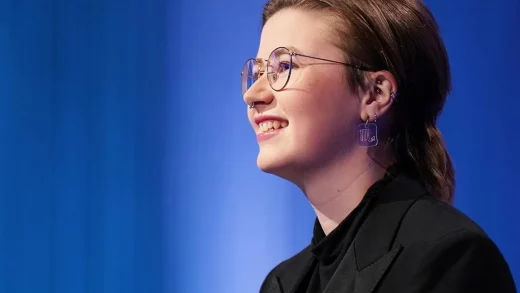:format(webp)/https://www.thestar.com/content/dam/thestar/entertainment/music/2023/04/26/how-montreal-singer-la-zarra-came-to-represent-france-in-eurovision-with-videmment/20230426100420-a826cdd4fdac163709dccea5edf895b55feb111e68e29a8cad8ecbe56eea158c.jpg)
LONDON – Just a few years ago, Fatima Zahra Hafdi was working in a series of hair salons in Montreal, hoping to one day find her true creative passion in life.
Next month, she steps onto the stage as La Zarra in perhaps the world’s most famous music competition, the Eurovision Song Contest, where she will represent France with the track “Évidemment” (“Obviously”). She co-wrote the song with Benny Adam, and they co-produced it with fellow Montrealers Banx & Ranx.
Countries all across Europe send an artist or band with a three-minute song to Eurovision every May. Among its most famous winners? Céline Dion, who won for Switzerland in 1988.
Last year, 161 million viewers watched the contest on television, with many more watching online.
Unlike Dion, who was essentially parachuted into Switzerland just for Eurovision, La Zarra is already well known in France. Her biggest hit to date, 2021’s “Tu t’en iras” (“You’ll Leave”) went platinum there and led to her winning the francophone Breakout Songwriter Award at the 2022 Society of Composers, Authors and Music Publishers of Canada (SOCAN) Awards.
La Zarra’s first foray into the music industry was a featuring credit on “Printemps blanc” (“White Spring”) with French rapper Niro in 2016.
“It was my first song ever,” she said in a phone interview in March, speaking in both English and French. “I just did it because (my producer Adam) asked me and then I went back to my regular life (as a hairdresser in Montreal).” Her next song would be released in 2020.
“I did a lot of small jobs that I didn’t really like. I think I never stuck more than three months in a job because I couldn’t. For me, it didn’t make sense to do something I don’t like and then die. Lucky me, music got into my life.”
La Zarra’s music integrates the American rap and pop she was exposed to in Montreal with French chanson, a form of French pop music especially popular in the mid-1900s that emphasizes the lyrics and often has a working-class vision of the world. This is the music her mother would sing to her as a child, and is epitomized by Edith Piaf’s “La vie en rose” and “Non, je ne regrette rien.”
“(Piaf is) kind of like my singing teacher. In the song, you can feel love, you can feel emotions that you don’t have in real life. That kind of music helped me escape reality.”
La Zarra was born and raised in Montreal as the third of seven children in a Moroccan-Canadian family. She describes her childhood as happy, but didn’t discuss her Moroccan roots at the beginning of her career, she says, because she didn’t want people to put her in a box.
She has also never divulged her age online, and is slightly baffled but plays along when incorrect numbers are thrown out. “I don’t know why people are so obsessed with my age. (Is it) because I’m a woman? … to compare me? But I think it’s funny so they will never know.”
What she couldn’t hide, though, was her talent.
“When I decided that I wanted to do (music) at the end of 2019, I (had) just four demo songs and everybody was amazed. I was like, ‘OK, that’s easy!’
“After that, (there were) ups and downs. It’s really hard work, because it’s day and night … And now, I see that my mother is already relieved that I can live off of music. Those close to me see that music pays, and I think I’m making them proud.”
In recent years, France has chosen its Eurovision entrant via a televised contest.
But the head of the French delegation to Eurovision, Alexandra Redde-Amiel, says she was ready to cancel the national competition if La Zarra agreed to represent them.
La Zarra, who lives in Paris, had been approached in previous years but it was never the right timing, and she didn’t see herself entering the selection contest. She’d already started writing “Évidemment” before Redde-Amiel approached her, and then reworked it for Eurovision with Adam and Banx & Ranx.
“We loved it immediately when she suggested it to us. It’s the great French chanson but with a strong, Eurovisionesque refrain that stays in your head,” says Redde-Amiel. “It’s very ‘Emily in Paris.’”
La Zarra says Redde-Amiel told her she’d be the perfect representative for France “because of my music, of what my lyrics say, and of how I represent womanhood.”
France also hopes to gain an advantage with La Zarra’s international connections this year, as for the first time ever, viewers from non-participating countries — including Canada and Morocco — will be able to vote online and through the Eurovision app.
To promote the song, La Zarra performed at a Eurovision pre-party in Madrid, although she had to pull out of similar performances in Amsterdam and London two weekends ago for family reasons.
Social media promo efforts may also have helped the song reach 3.3 million views on YouTube, the fourth highest among the 38 competing songs.
La Zarra is currently fourth in the betting odds. The BBC has called “Évidemment” a “potential winner” and describes the song as “quietly gorgeous, like a sort of Sunday morning Dua Lipa.”
“Following in the footsteps of Céline Dion, who’s had an incredible career — it’s a bit of pressure, but I’m confident in my work and I hope to be up to the task and to be able to do justice to my predecessors,” says La Zarra. (Natasha St-Pier, from New Brunswick, also represented France in 2001, finishing fourth.)
“Évidemment,” like La Zarra’s other singles to date, is entirely in French.
She intends to release music in English within the next two years or so, but under a different stage name — La Zarra will remain francophone. La Zarra would also like to export her French music to the English-speaking world.
“People who sing in Spanish do well in the English market,” she notes. “Why not French music?”
As one of the “Big Five” nations that contributes the most financially to Eurovision, France has automatically qualified for the final. Canadians can watch on YouTube and vote for La Zarra (or their other favourites) on May 13.
Jeffrey Mo is a London-based freelance writer from Calgary.
This report by The Canadian Press was first published April 26, 2023.
JOIN THE CONVERSATION
does not endorse these opinions.


